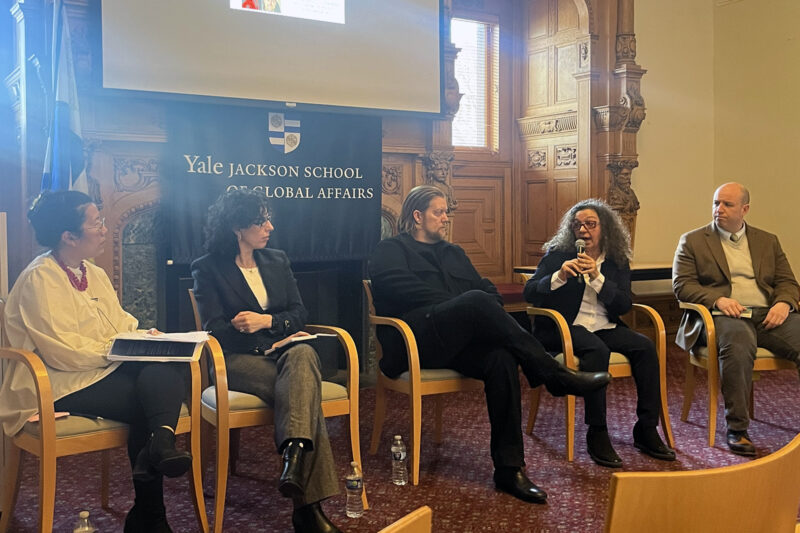On February 29, the Jackson School and the Yale School of Public Health co-hosted the discussion, “Public Health Approaches to Reducing Targeted Violence.”
Speakers included: Dr. Megan Ranney, dean of the Yale School of Public Health and expert on gun violence; Matthew Schumacher, a Navy veteran and clinical and operational psychologist for the Los Angeles Sheriff Division; Myrieme Churchill, executive director of Parents for Peace who specializes in deradicalizing extremists and supporting their families; and Brian Hughes, acting director of the Polarization and Extremism Research and Innovation Lab (PERIL) based at American University, which focuses on preventing radicalization.
Panelists discussed the current limitations surrounding targeted violence prevention, and what could be done to strengthen systems to reduce risk using public health approaches. It was moderated by Shan Soe-Lin, a lecturer at the Jackson School.
Stopping School Shootings
Schumacher is a national security psychologist who specializes in protective intelligence – protecting groups or targets, including schools.
Students who carry out school shootings are likely to be from the school, and many are in crisis, Schumacher said.
Most mass shooters, especially if they’re radicalized, will have had some sort of suicide attempt, an admission to a hospital, or suicidal ideation, Schumacher explained.
Instead of looking for signs that a student has been radicalized, he recommends training school resource officers to identify suicidal students.
“You could have 100 school resource officers in 100 schools over 100 years and maybe find one or two radicalized persons. But you will find thousands upon thousands of kids that are suicidal,” he said.
“I wouldn’t bother training the police to deal with radicalization because they could never see it,” Schumacher said. Instead, he would teach them the warning signs of a suicide crisis, and how to get help. He advises against punishment as it can worsen a person’s grievances.
By looking for early warning signs, and intervening, you are “starting the conversations much sooner than left of bang,” Schumacher said.
The goal is to get to the place where the person under stress is, as soon as possible, “so we’re not waiting for full-blown PTSD or a suicide attempt,” he said. “All of this stuff gets paid forward in the rest of society and does become a sort of contagion. So, if we can, we stop that process earlier,” he said.
“We’re trying to be left of bang. But I don’t think we should be anywhere near bang, by the way,” he added.
Parents for Peace
Myrieme Nadri-Churchill, a native of Morocco, was so affected by being a targeted as a child for having a Black Muslim father and a white Christian mother that she became a therapist. As the executive director of Parents For Peace, Nadri-Churchill specializes in deradicalizing extremists and supporting their families.
As she traveled around the world to meet the families of terrorists, Nadri-Churchill realized that parents don’t always understand the signs that their son or daughter is being radicalized, and when they do, they don’t know where to turn for help. She also learned that “parents do not call the cops on their children,” she said.
Parents for Peace is “pioneering a public health approach to extremism prevention.” In 2017, the organization launched a helpline for families and individuals to call when they see the first signs of radicalization.
Nadri-Churchill is concerned that “the people we are seeing are younger and younger, from 12 to 14 years old. This is not normal,” she said.
“People who are drawn into extremism are using extremism as a drug of choice, a coping mechanism,” she said. “Just like someone would use drugs to numb their pain, they are using ideology to numb their pain.”
Resources to End Radicalization
“We’re trying to address problems before they have to be handed off to Myrieme or Dr. Schumacher,” said Brian Hughes of the Polarization and Extremism Research and Innovation Lab (PERIL) based at American University.
“By the time a case gets referred to Parents for Peace, a tragedy has already occurred – something profound has gone wrong – an act of violence or criminality, and the problem has the potential to metastasize,” he said. “We want to reduce or eliminate that potential for violence in the first place.”
Radicalization occurs when someone’s online activities – reading, watching videos, or socializing – leads them to adopt politically or religiously extremist views. Extremists believe that an imagined conflict between groups of people can only be resolved through separation, domination, or violence. This frequently leads to anti-democratic opinions and goals.
Hughes’ team creates public health videos to educate people about the ways extremist propaganda can manipulate individuals to believe in things that are false. People who watch the videos are more likely to recognize and resist manipulative extremist propaganda, he said.
